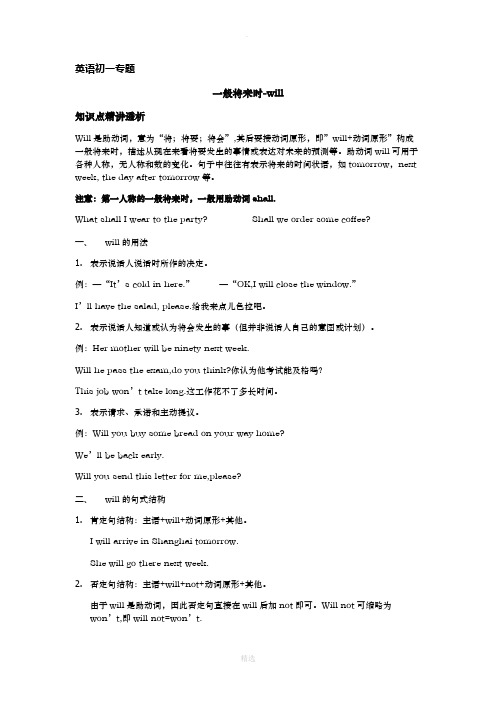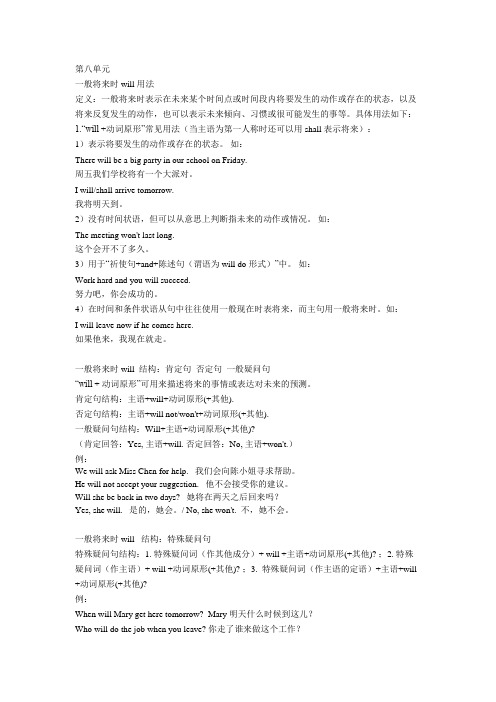Will一般将来时
will作动词的四种形式

will作动词的四种形式Will作为动词有四种形式:will, will have, will be, will be having。
下面将分别对这四种形式进行解释和举例说明。
1. willwill作为一般将来时的情态动词,表示将要发生的动作或存在的状态。
它用于表示主观的意愿、决心、承诺、预测、推测等。
例如:- I will go to the concert tomorrow.(我明天会去听音乐会。
)- She will help you with your homework.(她会帮你做作业。
)- They will arrive at the airport at 6 PM.(他们会在下午6点到达机场。
)2. will havewill have用于表示将来某一时间点之前已经完成的动作。
它表示对将来某一时刻或某一动作的预测或推测。
例如:- By the time you arrive, I will have finished cooking dinner.(等你到达的时候,我会已经做好晚饭了。
)- She will have graduated from university by next year.(她到明年会已经大学毕业了。
)- They will have arrived at the hotel before noon.(他们到中午之前会已经到达酒店。
)3. will bewill be用于表示将来某一时刻正在进行的动作或存在的状态。
它表示对将来某一时刻的预测或推测。
例如:- I will be studying for the exam this time tomorrow.(明天这个时候我会正在备考。
)- She will be working at the office all day tomorrow.(明天一整天她会在办公室工作。
)- They will be traveling around Europe next month.(下个月他们会在欧洲旅行。
Will一般将来时

用于表示对未来趋势或发展变化的预测和推测
用于表示对未来情况的假设和设想
用于表示对未来的预测,常与情态动词will连用
用于表示对未来可能发生的情况的推测,常与情态动词may、might、could等连用
表示未来的趋势和变化
用于表达对未来的期望和愿望
表示将来某个时间点将要发生的事情
用于描述未来的趋势和预测
在日常对话中,使用一般将来时也可以表达礼貌和委婉的语气,特别是在提出自己的观点或建议时,使用一般将来时可以让对方更容易接受自己的意见。
在写作中,使用一般将来时来表达礼貌和委婉的语气需要注意时态的准确性,避免与其他时态混淆,影响表达效果。
03
一般将来时的注意事项
注意时态的正确使用
避免混淆时态:一般将来时表示未来的动作或状态,应避免与过去时态混淆。
注意与一般现在时的区分
注意时态的一致性
注意动词时态的一致性
确保主句和从句的时态一致
注意时态的特殊用法和固定搭配
掌握时态的基本规则和变化规律
根据语境选择合适的时态
04
一般将来时的实际应用
在写作中的应用
描述未来计划或预测
描述未来的趋势或发展
表达对未来的期望或愿景
编写科幻小说或描绘未来世界
在口语中的应用
考虑语境的适应性:根据上下文和情境选择合适的表达方式,使句子更符合语境。
注意语气的恰当性:根据说话者和听众的关系、场合等因素,恰当地表达语气,使表达更自然、得体。
避免过于复杂或冗长的句子结构:尽量使用简单、明了的句子,避免让听众感到困惑或疲劳。
注意与其他时态的区分
区分一般将来时与过去将来时
避免与现在进行时混淆
疑问句:Will + 主语 + 动词原形
一般将来时will

英语初一专题一般将来时-will知识点精讲透析Will是助动词,意为“将;将要;将会”,其后要接动词原形,即”will+动词原形”构成一般将来时,描述从现在来看将要发生的事情或表达对未来的预测等。
助动词will可用于各种人称,无人称和数的变化。
句子中往往有表示将来的时间状语,如tomorrow,next week, the day after tomorrow等。
注意:第一人称的一般将来时,一般用助动词shall.What shall I wear to the party? Shall we order some coffee?一、will的用法1.表示说话人说话时所作的决定。
例:—“It’s cold in here.”—“OK,I will close the window.”I’ll have the salad, please.给我来点儿色拉吧。
2.表示说话人知道或认为将会发生的事(但并非说话人自己的意图或计划)。
例:Her mother will be ninety next week.Will he pass the exam,do you think?你认为他考试能及格吗?This job won’t take long.这工作花不了多长时间。
3.表示请求、承诺和主动提议。
例:Will you buy some bread on your way home?We’ll be back early.Will you send this letter for me,please?二、will的句式结构1.肯定句结构:主语+will+动词原形+其他。
I will arrive in Shanghai tomorrow.She will go there next week.2.否定句结构:主语+will+not+动词原形+其他。
由于will是助动词,因此否定句直接在will后加not即可。
一般将来时will的用法

用will表示承诺和要求
Will也常用来表示承诺和要求。它可以表达你对某件事的承诺,或者向他人提 出请求。例如: I will finish the report by tomorrow. Will you please pass me the salt?
用will表示预测和推测
Will还可以用来表示预测和推测。它可以表达对未来情况的猜测或预测。例如:
用will表示安排和计划
Will也常用来表示安排和计划。它可以表达你将要做某事,并已经安排好了。例如: I will meet you at the airport tomorrow. They will have a meeting at 3 PM.
用will表示习惯和经验
Will还可以用来表示习惯和经验。尽管它是将来时,但在这种情况下表示的是 过去经常发生的动作或情况。例如: When I was young, I will go swimming every weekend. He will always eat lunch at his desk.
在口语中使用will时,有一些常见错误要避免。例如: 错误:I will g o to the park tom orrow. (不要用will来表示明确的计划或安 排。) 正确:I'm g oing to the park tom o rrow.
常见的缩略形式
在口语中,will有一些常见的缩略形式。例如: I'll go to the store later. She won't be able to come tomorrow.
肯定句的构成
在一般将来时的肯定句中,主语后面跟上will动词,然后是动词的原形。例如: I will study for the exam. He will travel to Europe next month.
一般将来时:will

第八单元一般将来时will 用法定义:一般将来时表示在未来某个时间点或时间段内将要发生的动作或存在的状态,以及将来反复发生的动作,也可以表示未来倾向、习惯或很可能发生的事等。
具体用法如下:1.“will +动词原形”常见用法(当主语为第一人称时还可以用shall表示将来):1)表示将要发生的动作或存在的状态。
如:There will be a big party in our school on Friday.周五我们学校将有一个大派对。
I will/shall arrive tomorrow.我将明天到。
2)没有时间状语,但可以从意思上判断指未来的动作或情况。
如:The meeting won't last long.这个会开不了多久。
3)用于“祈使句+and+陈述句(谓语为will do形式)”中。
如:Work hard and you will succeed.努力吧,你会成功的。
4)在时间和条件状语从句中往往使用一般现在时表将来,而主句用一般将来时。
如:I will leave now if he comes here.如果他来,我现在就走。
一般将来时will 结构:肯定句否定句一般疑问句“will + 动词原形”可用来描述将来的事情或表达对未来的预测。
肯定句结构:主语+will+动词原形(+其他).否定句结构:主语+will not/won't+动词原形(+其他).一般疑问句结构:Will+主语+动词原形(+其他)?(肯定回答:Yes, 主语+will. 否定回答:No, 主语+won't.)例:We will ask Miss Chen for help. 我们会向陈小姐寻求帮助。
He will not accept your suggestion. 他不会接受你的建议。
Will she be back in two days? 她将在两天之后回来吗?Yes, she will. 是的,她会。
一般将来时will

英语初一专题一般将来时 -will知识点精讲透析Will 是助动词,意为“将;将要;将会” ,其后要接动词原形,即”will+ 动词原形”构成一般将来时,描述从现在来看将要发生的事情或表达对未来的预测等。
助动词will 可用于各种人称,无人称和数的变化。
句子中往往有表示将来的时间状语,如tomorrow ,next week, the day after tomorrow 等。
注意:第一人称的一般将来时,一般用助动词shall.What shall I wear to the party? Shall we order some coffee?一、will 的用法1. 表示说话人说话时所作的决定。
例:—“It 's cold in here. ”—“OK,I will close the window. ”I 'll have the salad, please. 给我来点儿色拉吧。
2. 表示说话人知道或认为将会发生的事(但并非说话人自己的意图或计划)。
例:Her mother will be ninety next week.Will he pass the exam,do you think? 你认为他考试能及格吗?This job won 't take long. 这工作花不了多长时间。
3. 表示请求、承诺和主动提议。
例:Will you buy some bread on your way home?We 'llbe back early.Will you send this letter for me,please?二、will 的句式结构1. 肯定句结构:主语+will+ 动词原形+ 其他。
I will arrive in Shanghai tomorrow.She will go there next week.2. 否定句结构:主语+will+not+ 动词原形+ 其他。
一般将来时will结构讲解
语法点1:一般将来时will结构基本句型1.句型:主语+will+do(动词原形)+(宾语)+其它成分+将来时间状语表示主语在将来某个时间将要做某事。
2.will是构成一般将来时的助动词,有词义,意为“将,将要”,其后须接动词原形do,will+do构成句子的复合谓语。
3.时间状语:tomorrow,the day after tomorrow,in+一段时间,soon,next week/day/month/year等表将来的时间状语。
例句呈现He will play baseball with his classmate tomorrow.They will talk about the holiday plan tonight.The children will learn 300 Poems of Tang.语法点津(一)句型解读句型:主语+will+do(动词原形)+(宾语)...+将来时间状语1.表示主语将要做某事。
I will buy some books next week.We will try our best to win the game.2.do指动词原形。
助动词will后须接动词原形。
She often helps me with my English.She will help me with my English.The family spent the winter holiday in San Ya last year.一般过去时The family will spend the winter holiday in San Ya next year.一般将来时3.will没有人称和数的变化。
现代英语里,助动词will通用各种人称。
We will help them to raise money for the people in need.Tom will be in the long jump.You will get well soon.4.表将来的时间状语,如tomorrow,next week等。
语法一般将来时will讲解与练习
Grammar语法:simple future tense‘will’一般将来时1 表示将来某个时间要发生的动作或者存在的状态..We shall go to see him tomorrow. 我们明天去看他..2 表示将来经常或者反复发生的动作..From now on I will come everyday. 从现在起;我将每天来.. will表将来时态;其后常跟的时间状语: tomorrow 明天; the day after tomorrow后天;next week下周; this Sunday这个星期天; in+以后的时间;in the future在将来..肯定句结构主语+ shall / will +V原形She will arrive tomorrow. 她明天到..shall与will的区别shall:常用于第一人称否定式: shall not=shan’twill: 常用于第二、第三人称;但在口语中各种人常都可以用will 否定式:will not=won’t否定句结构主语+ shall / will+ not +V原形She will not arrive tomorrow. 他明天不会到..一般疑问句结构Shall/Will+主语+V原形肯定回答:Yes; I/we + shall. / Yes. 主语+will.否定回答:No; I/we shan’t./No; 主语+ won’t.— Will she arrive tomorrow 她明天会到吗— Yes;she will. / No; she won’t.will/shall的特殊用法1 主语是第一人称I;we时;常用助动词shall+V原形I shall write you a letter next month. 我下礼拜将会给你写信..2 在问对方是否愿意;或者表示客气的邀请时;常用will.Will you go to the zoo with me 你能和我一起去动物园吗3 在表示建议或者征求对方意见时;用shall.Shall we go at ten 我们可以十点钟走吗be going to 与 will的区别:1 be going to 表示近期、眼下就要发生的事情;will 表示的将来时间则较远一些;① He is going to write a letter tonight.② He will writea book one day.2 be going to表示根据主观判断将来肯定发生的事情;will表示客观上将来势必发生的事情.. ① He is seriously ill. He is going to die. ② He will be twenty years old.3 be going to 含有“计划;准备”的意思;而 will 则没有这个意① She is going to lend us her book. ② He will be here in half an hour.4 在有条件从句的主句中;一般不用 be going to; 而多用will;If any beasts comes at you; I'll help you. 如果野兽攻击你;我会帮助你..练习一、单项选择1.The next time you see Niko; he _____sixteen years old.A. will beB. isC. wasD. will2.In ten years; John_______ an astronaut.A. isB. will beC. wasD. will3.I hope that you ____ a good time this evening.A. haveB. are havingC. will haveD. has4.Look at those big black clouds. It ____ rain. Let’s hurry.A. mustB. willC. wouldD. is going to5.There ____ a basketball match this afternoon.A. will haveB. will beC. hasD. have6.We ____ to the park if it is fine tomorrow.A. will goB. goC. goesD. to go7.There _____ a kite show in the zoo tomorrow.A. wasB. is going to haveC. will haveD. is going to8. Mother ______ me a nice present礼物 on my next birthday.A. will givesB. will giveC. givesD. give二、用一般将来时填空..借助will1. I _________ visit my uncle tomorrow.2. There _______ be a football match in our school next week.3. He __________ help you with your English this evening.4. We _________ have a meeting tomorrow.三、按要求完成下列句子..1. I will go to school by bike.改为一般疑问句________________________________________2.He will check his e-mails this afternoon.改为否定句__________________________________________.3.Li Ming and his friends will have a piano lesson. 改为一般疑问句并作肯定和否定回答__________________________________________ __________. ___________.4.There will be some robots in our homes. 改为否定句There _____ _____ _____ _____ robots in our homes.5.Everyone will have a small car. 对划线部分提问______ ____everyone _____四、用所给词的适当形式填空1.______ be you free tomorrow2.What _____ you _______________ do tomorrow morning3.Hurry up Or we _____ be late.。
一般将来时will
⼀般将来时will⼀般将来时will⼀、最基本的结构:will + 动词原形例句1:I/We/You/He/She/They will visit the museum tomorrow.明天我/我们/你/他/她/他们要去参观博物馆。
归纳1:⼀般将来时表⽰将来发⽣的动作或存在的状态,其构成形式为;其中will为助动词,(有/没有)⼈称和单复数的变化,可缩写为__________.例句2: They won’t visit the museum tomorrow.归纳2: 变否定句,在助动词will后加,缩写为例句3: ---Will they visit the museum tomorrow?---Yes, they will./ No, they won’t.归纳3:变⼀般疑问句,将提到主语前。
回答:肯定________ 否定_________.例句4:My father will work in Beijing next year.(划线部分提问)What _______your father _______next year?⼆、划出以下句⼦中与⼀般将来时连⽤的时间状语并写出其意思。
1. We will have a picnic tomorrow.( )2. He will come back the day after tomorrow. ( )3. You will see your daughter soon. ( )4. They will get to Beijing in three days. ( )5. What will happen in the future? ( )6. She will go to Dalian next week. ( )7. My dream will come true some day. ( )三、will主要⽤于在以下⼏个⽅⾯:1、表⽰单纯的未来“将要”通⽤各个⼈称。
语法一般将来时will讲解与练习
Grammar语法:simple future tense‘will'一般将来时1)表示将来某个时间要发生的动作或者存在的状态。
We shall go to see him tomorrow。
我们明天去看他。
2) 表示将来经常或者反复发生的动作.From now on I will come everyday。
从现在起,我将每天来.will表将来时态,其后常跟的时间状语: tomorrow 明天, the day after tomorrow后天,next week下周, this Sunday这个星期天, in+以后的时间,in the future在将来。
肯定句结构主语+ shall / will +V原形She will arrive tomorrow. 她明天到.shall与will的区别shall:常用于第一人称否定式:shall not=shan’twill: 常用于第二、第三人称,但在口语中各种人常都可以用will否定式:will not=won’t否定句结构主语+ shall / will+ not +V原形She will not arrive tomorrow. 他明天不会到。
一般疑问句结构Shall/Will+主语+V原形肯定回答:Yes, I/we + shall。
/ Yes。
主语+will。
否定回答:No, I/we shan’t./No, 主语+ won't.- Will she arrive tomorrow?她明天会到吗?— Yes,she will. / No, she won't.will/shall的特殊用法(1)主语是第一人称I,we时,常用助动词shall+V原形I shall write you a letter next month. 我下礼拜将会给你写信。
(2)在问对方是否愿意,或者表示客气的邀请时,常用will。
Will you go to the zoo with me?你能和我一起去动物园吗?(3 ) 在表示建议或者征求对方意见时,用shall.Shall we go at ten?我们可以十点钟走吗?be going to 与 will的区别:(1) be going to 表示近期、眼下就要发生的事情,will 表示的将来时间则较远一些,① He is going to write a letter tonight.② He will write a book one day.(2) be going to表示根据主观判断将来肯定发生的事情,will表示客观上将来势必发生的事情。
- 1、下载文档前请自行甄别文档内容的完整性,平台不提供额外的编辑、内容补充、找答案等附加服务。
- 2、"仅部分预览"的文档,不可在线预览部分如存在完整性等问题,可反馈申请退款(可完整预览的文档不适用该条件!)。
- 3、如文档侵犯您的权益,请联系客服反馈,我们会尽快为您处理(人工客服工作时间:9:00-18:30)。
3. Li Ming and his friends will have a piano lesson. (改为一般疑问句并作肯定和否定 回答) Will Li Ming and his friends have a piano lesson? Yes, they will. No, they won’t.
一般将来时
(Simple Future Tense )
一般将来时表示将来某一时刻的动作或状态, 或将来某一段时间内经常的动作或状态。
一般将来时的基本结构: be (am, is, are)going to+动词原形 will +动词原形
常见的时间状语: • • • • • next Tuesday next week next year the coming Sunday tomorrow • • • • • the day after tomorrow tonight in a few minutes in the future in five years
一般将来时的基本结构: be (am, is, are)going to+动词原形 (复习) will +动词原形
Wil观推测。
一般将来时的构成
Will引导的一般将来时,本身没有人称和数的变化,而 且后面接动词原形。 一般将来时句型结构: 1.肯定句:主语+ will + 动词原形+其他. 2.否定句:主语+will not /won’t+动词原形+其他.
3.一般疑问句:Will +主语+ 动词原形+其他?
肯定回答:Yes,主语(代词)+will.
否定回答:No,主语(代词)+won’t.
按要求改写下列句子。
1.I will go to school by bike. (改为一般疑问句) Will you go to school by bike? 2. He will check his emails this afternoon. (改为否定句) He won’t check his emails this afternoon.
